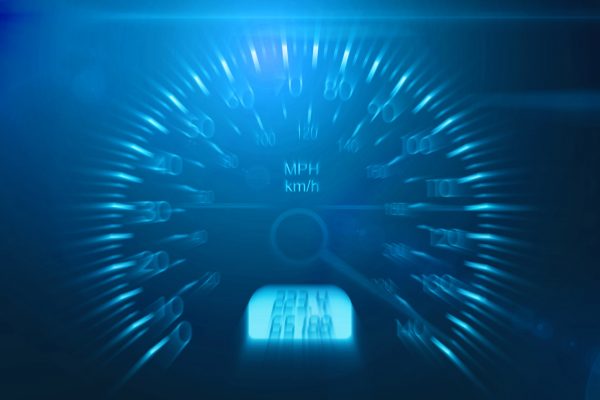How much is a speeding fine?

This article explains how much different types of speeding fines will cost you, how many points you’ll get on your licence and how long your disqualification from driving might be.
Speeding fines in the UK are split into several bands, with different costs and other penalties depending on how fast you were going and how far over the speed limit you were. The more you exceed the legal speed limit, the higher the fee and number of points you should expect.
How much does a speeding ticket cost?
The cost of a speeding ticket varies, and we’ll cover the specific fines for all bands; A, B, C, D, E and F below. The minimum penalty for being caught committing any speeding offence is a £100 fine and three points on your licence.
Many people are under the impression that speeding laws changed in 2017, but it was actually the sentencing for prosecuted drivers that was updated. According to current UK law, the speeding fines are dictated by what the speed limit was, how far over it you were, and what your typical monthly income is.
You’ll be charged a percentage of your monthly income as a fine, up to a maximum of £2,500, depending on the severity of your offence. You could also have your licence suspended or revoked.
Bands A, B and C
Band A fines are for drivers who have exceeded the speed limit by a small margin within the speed limit, while bands B and C apply to those caught further over the speed limit.
The National Police Chiefs’ Council recommends that police give drivers 10% leeway at lower speeds. However, it is important to remember this is a recommendation and is not the law.
Speed limit (mph)
Band A: Recorded Speed (mph)
Band B: Recorded Speed (mph)
Band C: Recorded Speed (mph)
20
21-30
31-40
41+
30
31-40
41-50
51+
40
41-55
56-65
66+
50
51-65
66-75
76+
60
61-80
81-90
91+
70
71-90
91-100
101+
Fine
25-75% of weekly income
75-125% of weekly income
125-175% of weekly income
Points
3
4-6*
6*
Disqualification
None
7-28 days*
7-56 days*
*Drivers will either receive points or disqualification
Other factors to consider, such as whether you were driving a heavy goods vehicle or near a school, may see you face a larger speeding fine.
Bands D, E and F
There are a number of things that can push your fine and points or disqualification into band D, band E or band F. These include speeding:
with any prior convictions
while on bail
with poor road and weather conditions
while driving a large vehicle
while towing a caravan or trailer
while carrying passengers or a heavy load
You can also be pushed into bands D, E or F if you were speeding in an area with a high level of traffic or pedestrians nearby. If you are breaking the speed limit by 30mph or more, you may be instantly disqualified from driving.
The speeding fines for bands D, E and F are as follows:
Band D
Band E
Band F
200% – 300% of your weekly income
300% – 500% of your weekly income
500% – 700% of your weekly income
The maximum fine for any band is £1,000, or £2,500 if you were driving on a motorway.
How long will the points stay on my licence?
Penalty points for speeding stay on your licence for four years from the date of conviction, and can’t be removed until their anniversary.
New drivers will be banned from driving by the DVLA if they receive six points within two years of passing their test. More experienced drivers are disqualified if they receive 12 or more points in a three-year period.
Will a speeding fine affect my insurance?
Your insurance company will check your driving licence for penalty points and convictions, along with past disqualifications, in order to determine what monthly or annual premiums you will be charged. If you have a history of speeding fines on your driving licence, insurers will generally charge you higher premiums.
At Adrian Flux, we can help to arrange an affordable insurance policy no matter how severe your driving convictions are through our specialist convicted driver insurance policies.
If you’ve been convicted of speeding offences, we believe that can actually make you a more cautious driver – not a higher risk. Our insurance premiums are tailored to your specific needs and circumstances, and we offer flexible and competitive quotes for everyone.
How long does it take a speeding ticket to come through?
If you are caught by a speed camera, you will typically have to wait up to 14 days for your Notice of Intended Prosecution (NIP) to arrive in the post. You should also receive a Section 172 notice. If you are caught by a police officer, you may be issued your speeding ticket on the spot.
Once you receive your NIP, you have 28 days to respond, and may be able to pay a lower fine if you respond quickly. Whether you accept the ticket or not, you must complete the Section 172 notice to declare who was driving your car at the time of the offence.
It’s worth noting the speeding ticket will be issued to the registered keeper of the vehicle, so if you’re driving a company car, your employer will be notified of the speeding fine.
Is there a 14 day rule on speeding tickets?
The speeding ticket 14 day rule states the police have 14 days to issue you with a speeding ticket after the offence has occurred. If you don’t receive your Notice of Intended Prosecution (NIP) within 14 days, any resultant prosecution may be considered invalid.
There are some exceptions to the 14-day rule, including if the police could not reasonably have found the information needed to send you the NIP within a 14-day period. For example, if you have moved house without updating your registered address.
If you are being charged for more than one speeding offence, you must be issued with a separate NIP for each one.
Can I be taken to court for speeding?

If you break the speed limit by a large enough amount, you will have to go to court. If you are summoned to court and do not go, you will almost certainly be found guilty.
If you receive a Notice of Intended Prosecution, respond guilty and accept your fine and points, you won’t need to go to court. However, if you respond to say that you are not guilty, you will be summoned to court to prove it.
In the event that you receive a court summons for speeding, you can request that all evidence against you be disclosed prior to making your plea of guilty or not guilty. If you plead not guilty and are found guilty by the court, your fine and the number of points you get could be higher than if you accepted the NIP to begin with.
Disputing a speeding ticket or fine
If you disagree with your speeding ticket or fine, you can dispute it. If you are issued a speeding fine and wish to challenge it, you can submit a not guilty plea or plea of mitigating circumstances. However, it is advisable to seek advice from a solicitor who specialises in motoring offences before taking these actions.
A NIP is unlikely to be overturned unless you can prove that you have reasonable grounds for your dispute.
Acceptable grounds for dispute
Acceptable grounds for disputing a speeding fine include:
you were not the person driving the car at the time
you weren’t speeding and can prove it
road signage stating the speed limit was missing, incorrect or obscured
your Notice of Intended Prosecution has been issued with missing or incorrect details
Unacceptable grounds for dispute
Common reasons for attempting to dispute a speeding ticket that are deemed unacceptable include:
not being aware of the speed limit
the roads were quiet and/or it was late at night
in a hurry due to an emergency
If you were speeding because of a genuine emergency and can prove it, this can be considered mitigating circumstances. This could, for example, be if a passenger’s life is in immediate danger and you are transporting them to the hospital. However, there are no set criteria for what is classed as a genuine emergency – each case is considered individually.
In some cases, showing proof of mitigating emergency circumstances could mean a reduction in your speeding fine. However, it is not grounds to dispute the fine in its entirety.
Do speeding tickets affect insurance?
If you’ve received penalty points on your licence as a result of a speeding offence and are looking for affordable insurance, Adrian Flux is here to help. We offer specialist policies for convicted drivers. Call our experiences staff today on 0800 369 8590 for a quote, or alternatively book a callback at a time that suits you.






